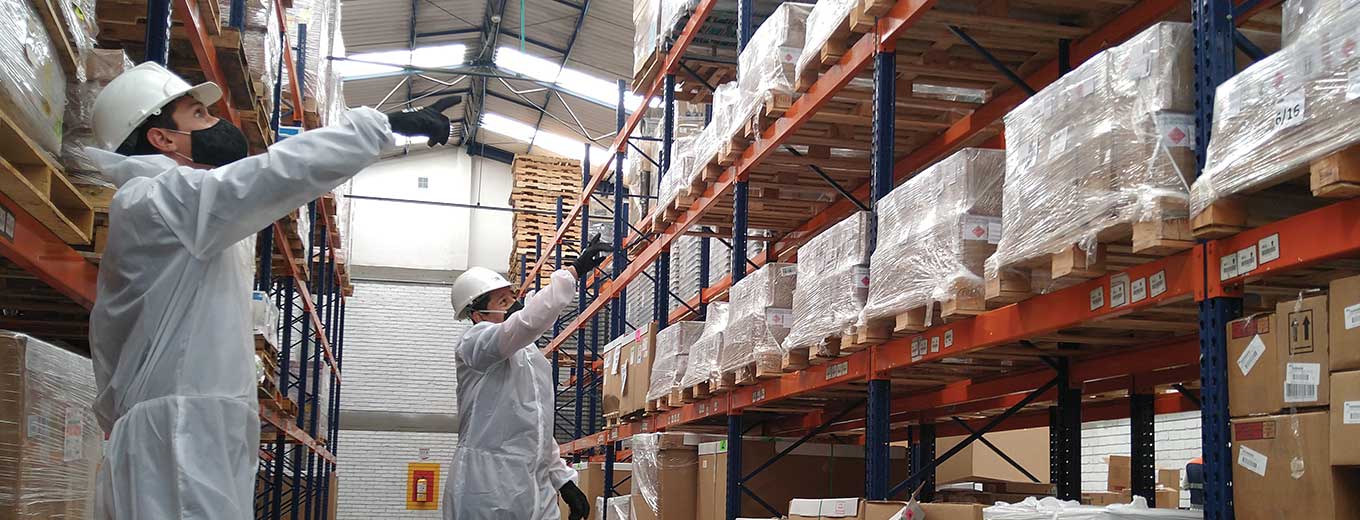Moving companies in South America are nothing if not resilient, given the region’s turbulent history. As the COVID-19 pandemic has pushed many businesses to the brink – and some to extinction – Andrew Bennett looks at how FIDI Affiliates in Colombia, Chile, Peru and Ecuador have hung on through the crisis, and are starting to plan for the future
Latin America continues to grapple with the COVID-19 crisis, which many in the region regard as a disaster that has driven shockwaves far beyond the world of commerce.
Countries including Chile, Colombia, Peru and Ecuador have been in the eye of the storm, recording high levels of virus infection. Although these were dropping at the time of writing, and there have been a few early signs of improvement, trading has still been very tough.
While the exact picture varies across these nations, the moving industry has been hard hit, with obstacles including closed borders, cancelled air traffic and quarantine measures. In some cities, such as Santiago and Lima, overnight curfews have been enforced.
I don’t think we are close to a recovery…without a vaccine, I do not expect any recovery until 2021
Vicente Avalos, Commercial Vice President at Insa International Shipping & Storage Co Ltd, FIDI’s only Affiliate in Ecuador, gives a flavour of what it has been like living through Latin America’s first COVID-19 wave.
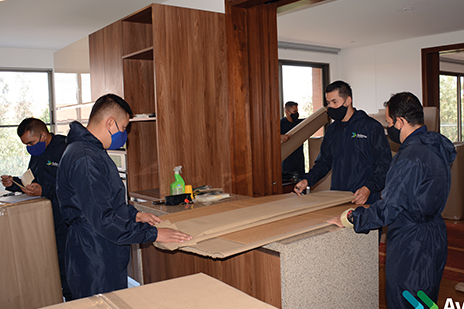
‘Our country, and especially our main port city, Guayaquil, was one of the most affected towns in Latin America in the first weeks of the pandemic. This city became the second place in the whole region, after Brazil, to have major numbers of infections and deaths,’ he says, adding that Guayaquil is notable for its success in recovering from the initial shock and, as such, provides the region with a good model to follow.
The World Bank projects that the region will lose 25 million jobs because of the pandemic, so there will be few companies or business sectors that will emerge untouched by COVID-19.
Mario Martinez, President of Security International Moving S.A.C. in Peru, a former FIDI Board member, said: ‘COVID-19 has exposed all our [country’s] weaknesses in poverty, informal labour, social health, public transportation, and, mainly, our basic infrastructure. The necessary extreme measures taken by our president produced a paralysis in our moving industry from mid-March to the beginning of June.’
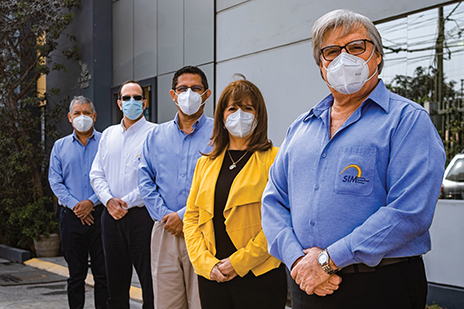
The fear barrier
In Chile, meanwhile, Decapack’s General Manager Ivonne Gutiérrez explains the impact of coronavirus on moving services:
‘Between the partial lockdowns and the severe government restrictions, it was difficult to operate. But the worst barrier was people’s fear. Most of our clients postponed their services until the third or fourth quarter of the year,’ she says.
‘Some of them were motivated by fear and others by the impossibility of flying or accessing their destination country. Inbound and relocation services were also severely affected, as well as our fine arts unit because of the closure of art exhibitions and museums in many countries. We also experienced a drop down in services coming from other countries in the region.’
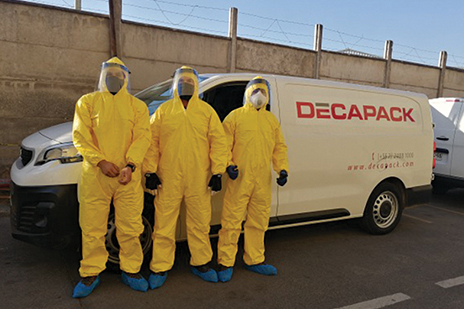
COVID-19 has exposed all our weaknesses in poverty, informal labour, social health, public transportation, and, mainly our basic infrastructure
Further north, in Colombia, life is also challenging. At Aviomar SA, Miguel Florez says: ‘Once someone arrives in Colombia, they must quarantine for 14 days. Each city and town has different rules related to local traffic or schedules. For example, in Bogota there was lockdown in zones of the city until 14 August, so it was necessary to get advance authorisations from the buildings’ administrations (for moving services).’
Maria Andrea Rodriguez, President, ABC Cargo Logistic S.A.S., adds: ‘We have seen a trend in the number of multinational employees whose assignments have been cut short and who must return to their origin country. However, because of the travel restrictions, most of those employees have been unable to return to the country. We have also seen an increase in destination requests for diplomatic missions. We have seen an increase in private charters for diplomats in and out of the country that are starting their mission or ending it.’
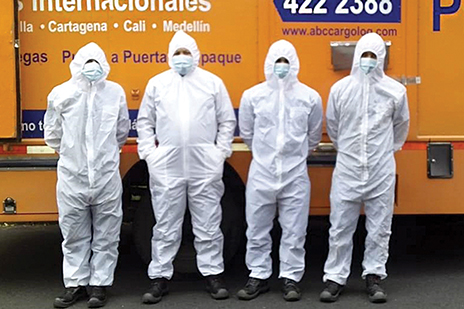
Colombia locked down in March, closing all borders to foreigners and grounding international flights, severely restricting movers’ air-freight options along with reduced freight and shipping, which were also subject to strict biosecurity measures. Flights had just started to resume from 1 September.
In Chile, Ward Van Lines S.A. is one of many moving companies adapting to the new regime required to stop the spread of the coronavirus – by using sanitisation, staff wearing personal protective equipment (PPE) and rapid weekly testing of staff for COVID-19 infection. It is not alone in taking extensive precautions. Once their clients agree, moving team members will sanitise a client’s house before the packing process begins.
At Unipack, another FIDI Affiliate based in Santiago, Chile, Finance and Administration Manager Felipe Silva believes the peak of the pandemic has passed, but – as with other international moving companies – COVID-19 has hit them hard.
There is a shortage of containers, as international trade levels have dropped to a minimum. This means we don’t have 100 per cent security about a container’s availability at the time of forwarding
‘As the Chilean ports and airports remain open and working, we have had no problems with any import customers we handle,’ says Silva. ‘But, for our export customers, we suffered some delays relating to getting the green light from our agents overseas and the reduction of the frequency of some shipping lines.’
A few encouraging signs have included a ‘better’ 2020 peak moving season than Unipack expected, but Silva adds: ‘I don’t think we are close to recovery. This disease shows itself to be very unpredictable, so, without a vaccine, I do not expect any recovery until 2021.’
Life is challenging
Very few countries globally have escaped the ravages of COVID-19. Paula Colmenares, CEO at Portan in Colombia, said: ‘People are stuck in their origin countries and their moving plans are on hold.’
Customs at ports and airports have imposed operational restrictions that increase clearance times and are reverting to what Colmenares calls ‘outrageous container demurrage’ and other charges.
She adds: ‘Many shipments are on hold because of the closure of borders, so people are not able to get in or out of the country. The closure of embassies and consulates is delaying visas, which also affects our operation.
‘There is a shortage of containers, as international trade levels have dropped to a minimum. This means we don’t have 100 per cent security about a container’s availability at the time of forwarding, to the point that we have been forced to make rollovers sometimes.
‘Another important fact is that, as there is not enough import and export traffic because of the low international trade levels, trucking companies cannot be assured of their round trips, increasing their one-way freight charge from cities to ports and vice versa.’
‘Only the strong will survive’
Because of the crisis and decline in trade, some companies have had to take drastic action, including salary cuts. In some cases, they have had to make staff redundant or reduce pay. However, at the time of writing, restrictions in Chile – which never experienced a nationwide lockdown – were being lifted, so more moving has been possible. Recent months have left scars on the moving industry, battling as it has been against factors including downward pressures on prices.
In Colombia, Aviomar’s Florez says: ‘Another big factor is the cash-flow impact that COVID-19 has had… on top of this, the aggressive price reduction is not offering a promising future for our industry. Only the strong companies will survive.’
Political and social movements generate great uncertainty in the region, and foreign investment – such as intra-region investment – has declined
Rodriguez adds that the pandemic is likely to cause a shift in the industry’s seasonal norms and is causing concern about the future of the business, too. ‘There is a lot of uncertainty that worries us and the whole industry,’ she says.
‘We believe that what was known of peak-season months may shift. September used to be a low-season month, but with the reopening of the frontiers, we believe that we will expect a high season from September to January 2021.
‘The increase in unemployment worldwide, leading to an increase in productivity with fewer resources, the shift of in-person interactions to virtual interactions, and the reduction of budgets that used to be allocated for mobility services are some of the factors that we believe are creating big disruption to what we knew regarding international assignments.’
Aside from COVID-19, in Ecuador, Insa International has faced several additional headaches. These include: extended payment credit terms by multinational and local customers; reduction in volume and weight per shipment; reduction in revenue per pound or cubic feet shipped; and high operating costs because of the ‘dollarisation’ (adoption of the US dollar) of the country’s economy.
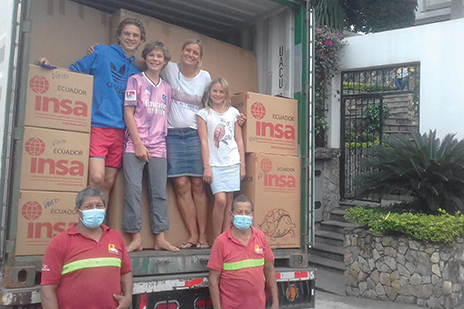
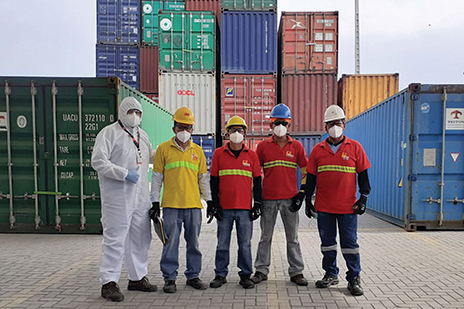
Some Affiliates also refer to many migrant workers crossing borders to look for work, including those who have left Venezuela or other impoverished nations, such as Bolivia or Haiti, to start new lives.
However, Sebastian Laporta, Managing Director of Ward Van Lines, adds: ‘Just months before the COVID-19 crisis, several Latin American countries, such as Chile, Colombia and Mexico, were experiencing social unrest, mainly because of social differences.
‘In turn, we have seen more and more extreme populist governments. All these political and social movements generate great uncertainty in the region and, therefore, foreign investment – such as intra-region investment – has declined.’
Looking beyond COVID-19
With some restrictions now easing, business is beginning to flow, but Affiliates think it will be some time before economies start to recover to anything like pre-COVID levels.
Some note the growth potential of industry, including retail and consumer goods (cited, for example, by Decapack in Chile), while others are looking to the commodities industry, pharmaceuticals, online retailers and supermarkets – essential sectors that, by their nature, have had to be kept moving during the pandemic.
FIDI Affiliates have been taking full advantage of new technology. Portan’s Colmenares says: ‘Digital technologies have definitely brought many benefits; I don’t think the business would be running without them. Zoom meetings are becoming the new normal interaction.’
Some fear, however, that the technology revolution may work against the moving industry by making executives less inclined to relocate abroad. ‘I am very concerned that teleworking will affect our business,’ says Ward Van Lines’ Laporta.
Riding the ups and downs
While Latin America and its FIDI movers rebuild – or hang onto – business in the coming months, it’s clear that COVID-19 has brought a new perspective. Despite the challenges of the past six months, Maria Andrea Rodriguez, President, ABC Cargo Logistic S.A.S.,is resolute. ‘Latin America is a region that has gone through a few crises since its inception,’ she says.
‘However, we are very persistent, and it has played in our favour, allowing us to recover from all these setbacks. We are confident that Colombia will manage to decrease the impact of COVID-19 and that, slowly but surely, we will arrive at the new normal.’
Security International’s Mario Martinez says Latin America has become used to up and downs. Lately, job losses and the closure of businesses because of COVID-19 are thought to have affected 60 per cent of low-income families in Latin America and the Caribbean.
‘Latin America, generally, has gone through a process of eliminating corruption in its governments and private and public organisations,’ he says. ‘Because of this, we can see a light at the end of the tunnel, having more transparent government administrations.
‘On the other hand, Peru has experienced so many difficulties in its almost 200 years of existence, and learned to overcome them with resilience, faith and hard work. In Peru, we have a saying: “We all know that God is Peruvian.”’
FIDI AFFILIATES IN CHILE, COLOMBIA, ECUADOR AND PERU
| DECAPACK | AFFILIATE | SANTIAGO | CHILE |
| UNIPACK S.A | AFFILIATE | SANTIAGO | CHILE |
| WARD VAN LINES S.A | AFFILIATE | SANTIAGO | CHILE |
| ABC CARGO LOGISTICS S.A.S | AFFILIATE | BOGOTA | COLOMBIA |
| AVIOMAR S.A | AFFILIATE | BOGOTA | COLOMBIA |
| INTRAMAR SHIPPING S.A | AFFILIATE | BOGOTA | COLOMBIA |
| PORTAN | AFFILIATE | BOGOTA | COLOMBIA |
| INSA INTERNATIONAL SHIPPING & STORAGE CO. LTD | AFFILIATE | QUITO | ECUADOR |
| CLASS INTERNATIONAL MOVERS, S.A | AFFILIATE | LIMA | PERU |
| EXPRESS TRANSPORTS S.A | AFFILIATE | LIMA | PERU |
| SECURITY INTERNATIONAL MOVINGS S.A.C | AFFILIATE | LIMA | PERU |

